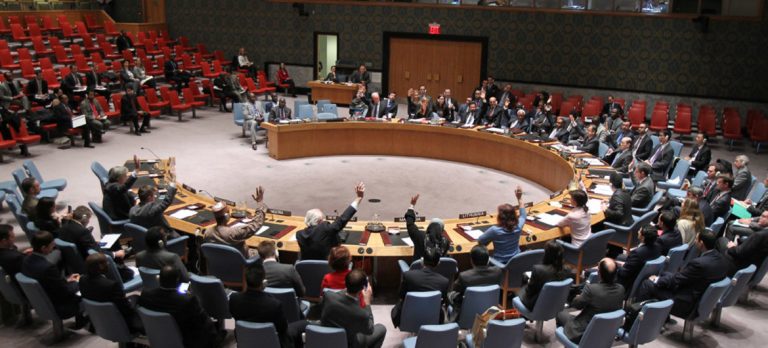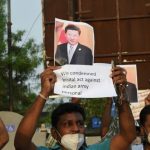Since Woodrow Wilson made his speech in Indianapolis in 1919 regarding the usefulness of sanctions, the debate still remains controversial, focusing primarily on their effectiveness as a tool of foreign policy instead of war in the international system.
The sanctions are exercised when one sovereign State or group of States wants to change the conduct of another, thus becoming part of international diplomacy. This is a tool for coercing sanctioned Governments into particular purposes, such as the fighting of terrorism and the proliferation of weapons of mass destruction; and as a restrictive measure to uphold respect for international law, human rights, democracy, the rule of law and good governance. The fact that many countries become increasingly dependent in the exchange of goods or in other areas of economy, globalization, the movement of financial flows make economic sanctions one of the most popular of the recent years, and are seen as the most important alternative to the military power in international relations. The UN can pose the sanctions, but they can also be regional or unilateral. The UN Security Council (SC), which has the responsibility of the maintenance and restoration of international peace and security, may sanction only those actors that constitute a threat to the peace in violation of international law. It would be one of the most efficacy cases to impose sanctions since all UN member States have the obligation to respect them. But it takes one veto from the P5 for the SC to not be able to act and take decisions. In such cases regional or multilateral sanctions are the only option. Usually it is one country that takes the initiative and carries out a campaign to bring more countries on the list of those to impose sanctions. Sanctions can be targeted in two ways: they may target specific goods or services crucial to the economy of the target country, or they may target specific individuals or legal entities of the country that are somehow implicated. Such targeted sanctions are considered to exert maximum pressure on the leadership of the target state. Restricting the flow of goods, imposing financial restrictions, the deprivation can force the sanctionee to change behavior in order to rejoin the international community. The most wanted effect is centered in the idea that sanctions will harm the interest of some sectors of the sanctionee country, which will in turn exert pressure on their government to comply with the demands of the sender. The sanctions can be Individual (travel ban, asset freeze and transfer), diplomatic (revision of visa policies, limiting of travel of diplomatic personnel, closing embassies or diplomatic offices, limiting numbers of diplomatic personnel), sectorial (arms import embargo, aviation ban, arms export ban, proliferation-sensitive material, shipping, oils service equipment), commodity (diamonds, import ban, luxury goods, charcoal, other), financial (investment ban, diaspora tax, central bank asset freeze, financial services, sovereign wealth funds). Sanctioning is an exercise of power in foreign policy. The sanctions must be coercive, but are not punitive. In relation to costs should lead to a change of attitude on the sanctionee. While we know that sanctions are a tool of foreign policy, the debate on how effective or not sanctions are is very lively. The literature of economic sanctions is divided between optimists; pessimists, who argue that sanctions do not weaken but strengthen the leadership; and relativists who say that they work only in certain circumstances and according to specific objectives. The criticisms focus on the fact that more often economic pain is not always translated into political change, that sanctions often hurt the people they are intended to help and that the time taken to see results is quite long. Sanctions are criticized because they are not effective in changing the behavior of targets and having high costs also for sanctionees. Sanctions can also have another downside provoking a defensive or solidarity reaction on the part of the sanctionee country and its population. Empirical research has shown that 34% of the sanctions since 1914 has been successful. All these reasons are observed and discussed by those who in the empirical research and achievements see the effectiveness of sanctions. Anyway, in most cases, none of the pessimistic views manage to provide a useful alternative to achieve the goals that should be achieved. Do sanctions work, or not? The right question would rather be:
What do sanctions aim to achieve, and when do they work?
What do they aim to achieve?
The main objective of sanctions is to change particular offensive policies and/or to remove the leaders responsible for them. For practical or politic reasons, it is not possible to answer to all the crises through military force. The sanctions are placed between the two extremes: the use of military force or inaction. Sanctions are policy tools that can have specific effects and their success as every tool should be decided only after a realistic evaluation if they met their expected results after having fixed the type of target and objectives already preset. There are no clear indicators for success or failure of sanctions and they are not divided in black and white. To understand the potential success of sanctions one should regard their expected impact. Consequently, their effectiveness can be evaluated based on the impact sanctions are aimed to achieve. It is not important to focus only on coercion. To have success in foreign policy sanctions can coerce (impose behavioral change on the target), but they can also constrain actors (reduce their capacity to engage in the unwanted activities) so to prevent the target from achieving its goals, or they can give powerful signals (send messages to audiences, about international or domestic norms to be punished). The sanctions can coerce, constrain and give signals in the same time or in different moments. That’s why sanctions’ effectiveness should be established according to the degree of achievement of their purpose. We always need to focus on the political objectives and assess the ability of sanctions to engender the desired political result. When do sanctions work? Sanctions work when they can bring the highest contribution to the overall strategy. The sanctionee should clearly identify the objective; know the expectations and the costs to which the sanctioners undergo from the beginning.
Sanctions appear like a problematic tool. They have a cost, not only for the sanctionee but also for the sanctioned. But, the cost of the sanctionee is much higher. Once the goals and expectations are established, only the determination and seriousness in the application of sanctions provides a greater chance of success to achieve foreign policy objectives, sanctioners should adopt a multiplicity of tools simultaneously. Their effectiveness can be reached only when combined with other foreign policy tools. Carrots are be as important as sticks. Any evaluation of the sanctions’ success cannot be made unless there has been a thorough evaluation of what would happen in the absence of the sanctions, and what other tools would the international diplomacy use in that case. Sanctions should be considered unsuccessful, only if there are alternative actions than could achieve better results. The alternatives of sanctions in most of the cases are war or inaction. Inaction or even appeasements are not alternative options. Inaction has historically led to greater challenge. The temptation to ignore potential threat thinking to avoid high costs is a historical dangerous option. In the same time, the military interventions can result serious inconveniences. Sanctions are often controversial and their effectiveness is not assured, but in front of the two mentioned options the intermediary ones are necessary. Despite the various criticisms that the policy-makers still seem to shout out, sanctions provide a more hopeful view.
Author
-

Researcher on International Relations Middle East and Balkans
View all posts
CSSII- Centro Interdipartimentale di Studi Strategici, Internazionali e Imprenditoriali,
Università di Firenze, Italy, Albania




